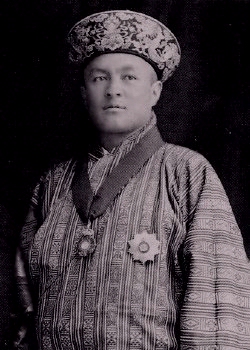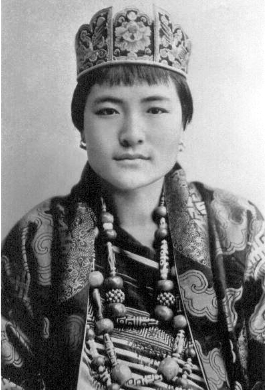
"Druk Tsenden" is the national anthem of Bhutan. Adopted in 1953, the lyrics were written by Dolop Droep Namgay and possibly translated into English by Dasho Gyaldun Thinley. The accompanying music was composed by Aku Tongmi.

Jigme Singye Wangchuck is a member of the House of Wangchuck who was the king of Bhutan from 1972 until his abdication in 2006.

Jigme Wangchuck was the 2nd Druk Gyalpo or king of Bhutan from 26 August 1926, until his death. He pursued legal and infrastructural reform during his reign. Bhutan continued to maintain almost complete isolation from the outside world during this period; its only foreign relations were with the British Raj in India, under which Bhutan was a protected state. He was succeeded by his son, Jigme Dorji Wangchuck.

Jigme Dorji Wangchuck was the 3rd Druk Gyalpo of Bhutan.

Gongsar Ugyen Wangchuck was the first Druk Gyalpo (King) and founding father of the Kingdom of Bhutan from 1907 to 1926. In his lifetime, he made efforts to unite the fledgling country and gain the trust of the people.
DashoLhendup Dorji was a member of the Dorji family of Bhutan. He was also the brother of the Queen of Bhutan, Ashi Kesang choden and uncle to the fourth king of Bhutan, King Jigme Singye Wangchuck. He served as acting Lyonchen following the assassination of his brother, Lyonchen Jigme Palden Dorji, on April 5, 1964.

The Wangchuck dynasty have held the hereditary position of Druk Gyalpo of Bhutan since 1907. Prior to reunification, the Wangchuck family had governed the district of Trongsa as descendants of Dungkar Choji. They eventually overpowered other regional lords and earned the favour of the British Empire. After consolidating power, the 12th Penlop of Trongsa Gongsar Ugyen Wangchuck was elected Druk Gyalpo, thus founding the dynasty. The position of Druk Gyalpo – who heads the royal family of Bhutan – is more commonly known in English as the King of Bhutan, however "Druk Gyalpo" would be translated literally as "Dragon King"

The Council of Ministers is the highest executive body in Bhutan. It was created in 1999 by Jigme Singye Wangchuck, the fourth King of Bhutan.
Princess AshiKesang Choden Wangchuck, is a member of the royal family of Bhutan. She is a daughter of the fourth King of Bhutan Jigme Singye Wangchuck and Queen Mother Ashi Tshering Pem Wangchuck, one of the former king's four wives, all of whom are sisters and held the title 'queen consort'. She is a half-sister of the current Druk Gyalpo Jigme Khesar Namgyel Wangchuck, who became king following the abdication of his father Jigme Singye Wangchuck on 9 December 2006.
The development of Bhutanese democracy has been marked by the active encouragement and participation of reigning Bhutanese monarchs since the 1950s, beginning with legal reforms such as the abolition of slavery, and culminating in the enactment of Bhutan's Constitution. The first democratic elections in Bhutan began in 2007, and all levels of government had been democratically elected by 2011. These elections included Bhutan's first ever partisan National Assembly election. Democratization in Bhutan has been marred somewhat by the intervening large-scale expulsion and flight of Bhutanese refugees during the 1990s; the subject remains somewhat taboo in Bhutanese politics. Bhutan was ranked 13th most electoral democratic country in Asia according to V-Dem Democracy indices in 2023 with a score of 0.535 out of 1.
Pema Dorji was a Bhutanese doctor (drungtsho) of traditional Bhutanese and Tibetan medicine, was the first person to institutionalize traditional medicine in Bhutan. He was the founding director of the National Indigenous Medicine Hospital and of the Institute of Indigenous Medicine in the capital Thimphu, and the key person behind the establishment of the Health Department's indigenous clinics and dispensaries in all 20 districts of Bhutan which make available free treatment and medicine to all the citizens of Bhutan.
The Order of the Dragon King is the highest decoration of the Kingdom of Bhutan, awarded in recognition of a lifetime of service to the people and Kingdom of Bhutan. Existing in two categories, it is the pinnacle of the honor system in Bhutan and takes precedence over all other orders, decorations and medals. Consisting of two Classes manufactured in sterling silver, the First Class comprises a Breast Star and Sash Badge while the Second Class has only a Sash and Badge.
The Order of Great Victory of the Thunder Dragon is the Highest Civilian Decoration in Bhutan awarded in recognition for outstanding dedication, loyalty and commitment. Instituted by King Jigme Dorji Wangchuck on 9 February 1967 and reorganized by King Jigme Singye Wangchuck on 29 September 1985 as the country’s principal national honour, it was redesigned and instituted as the Second Highest Honor in the kingdom. The decoration consists of a Badge and a Star. Its postnominal letter is DWG.
The Order of Wheel of the Thunder Dragon is a Single Class Order ranking fourth in the Order of Precedence. It was instituted by King Jigme Dorji Wangchuck on 9 February 1967 and reorganized by King Jigme Khesar Namgyel Wangchuck in January 2008 and consists of a neck Badge and a matching miniature.

Ashi Phuntsho Choden was the queen consort of Bhutan, as the wife of King Jigme Wangchuck.

LyonpoSonam Tobgye is an eminent jurist from Bhutan. He served as Chief Justice of the High Court of Bhutan from 1991 through 2009 and as Chief Justice of the newly created Supreme Court of Bhutan from 2010 through 2014. He also served as president of SAARCLAW, the South Asian Association for Regional Co-operation in Law, from 2011 through 2014. His public service spanned 43 years, beginning as master of household to King Jigme Dorji Wangchuck and ending in constitutionally-mandated retirement at the age of 65.
Dorji is a Tibetan and Bhutanese given name and surname.

Lotay Tshering is a Bhutanese politician and surgeon who was the prime minister of Bhutan, in office from 7 November 2018 to 1 November 2023. He has also been the president of Druk Nyamrup Tshogpa since 14 May 2018.
The Order of the Beloved Son of the Dragon is a Single Class Order ranking fifth in the Order of Precedence. It was instituted by the 3rd King Jigme Dorji Wangchuck on 9 February 1967 and reorganized by the 5th King Jigme Khesar Namgyel Wangchuck on 7 November 2008 and consists of a neck Badge and a matching miniature. Awarded to Members of the Royal Bhutan Army, Royal Bodyguard, National Militia, Royal Bhutan Police and Forest Guards.
This page is based on this
Wikipedia article Text is available under the
CC BY-SA 4.0 license; additional terms may apply.
Images, videos and audio are available under their respective licenses.







